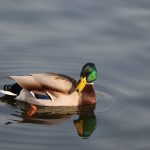wikiHow to Take Care of Ducklings
Find a brooding box. After ducklings have hatched from their shells and spent about 24 hours getting used to their new surroundings, they’re ready to move to a brooder. A plastic storage container, sturdy cardboard box, or large glass aquarium can all work for this purpose.
- The box should be well-insulated, since the ducklings need to stay warm. Don’t choose a box with too many holes in the sides or the bottom.
- Line the bottom of the box with wood shavings or old towels. Avoid using newspaper or other slippery material. Ducklings are still wobbly on their legs for the first few weeks after they hatch, and they can slip easily and hurt themselves on surfaces like plastic or newspaper.
Install a brooding lamp. Baby ducks need to be kept very warm in the first few weeks after they hatch, to give them the chance to get used to the chilly air outside their eggs. Buy a brooding lamp at a feed store or hardware store and affix it to the top of the brooder.
- Use a 100-watt bulb to start. For very young ducklings, this should create the right amount of heat.
- Make sure part of the brooder is located away from the heat, so they have a place to cool off if they need to.
- Make sure the bulb isn’t too close to the ducklings. This may cause them to overheat, or if they touch the bulb, they could get burned. If you’re using a shallow brooder, prop the lamp up higher using blocks of wood or another sturdy prop
Check the placement of the brooding lamp. Periodically check the lamp’s placement, ensuring that the ducklings are getting an appropriate amount of warmth.
- The heat and wattage of the lamp should be altered based on your ducklings’ behavior as they get older.
- If the ducklings tend to huddle close together under the lamp, they may be too cold and you should move the lamp closer or get a higher wattage bulb.
- If the ducklings are scattered out and breathing heavily, they’re most likely getting overheated, and you need to move the lamp further away or use a lower wattage bulb. Comfortable ducklings should be warm and settled.
Adjust the brooding lamp as the ducklings grow. As the ducks grow older, they will need less heat. Raise the lamp or change the bulb to a lower heat when they stop sleeping under it.
Part 2
Providing Water and Food
- Give your ducklings plenty of water. Put a shallow drinking bowl inside the brooder that is deep enough for the ducklings to dip in their beaks, but not their entire heads. Ducklings like to be able to clear their nostrils as they drink, but if you give them access to deeper water they could climb in and drown.
- Change the water and clean the bowl every day to make sure the ducklings don’t get sick from drinking dirty water.
- If you fear the bowl you have is a little too deep for your ducklings to drink from safely, lining the bottom with pebbles or marbles will make it safer for them.
- Feed the ducklings starter crumbs. Ducklings don’t eat for the first twenty-four hours after they hatch, since they’re still absorbing nutrients from the yolk inside the egg they hatched from. After that, they graduate to starter crumbs, tiny pellets of duck food available at feed supply stores. Buy a plastic feeder, fill it up, and place it in the brooder.
- If the ducklings seem hesitant to eat, try adding a little water to their food to make it easier for them to swallow. You can also add a very small amount of sugar to their water for the first couple of days to help them get off to a good start and give them energy.
- Feed weak ducklings duck egg yolk. Very weak ducklings may need a little extra yolk nutrition before they’re ready for starter crumbs. Feed them a bit of mashed duck egg yolk until they become more interested in the starter crumbs.
- Give the ducklings constant access to food. Make sure the ducklings have access to food 24/7. They need to be able to eat whenever they’re hungry since they grow so quickly at this stage of life. They also need water to help them swallow their food, so keep the water bowl full at all times.
- After about ten days, ducklings are ready for grower’s pellets, which are the same as the starter crumbs, only bigger.
- Switch to adult duck food. When the ducklings become adults, after about 16 weeks, they’re ready for adult duck food.
- Avoid feeding ducklings food that isn’t made for ducks. Many foods humans eat, like bread, don’t provide them with the nutrition that ducks need, and some can even make them sick.
- Even if the ducks are interested in food such as bread, it is not good for them.
- Ducks can have very thinly cut fruits and vegetables as a snack, but make sure their main meal is duck food.
- Don’t give ducklings food made for baby chickens. It doesn’t have the right nutrient makeup for ducklings.
- Never use medicated feed for ducklings. It can cause organ damage.
Source: www.wikihow.com
Image by Anrita1705 from Pixabay






